During the first six months of his life, breast milk is exclusively all that your baby needs. Complementary feeding, which means giving other foods in addition to breast milk, is a gradual shift that often begins once your baby has reached six months of age. This is actually a fun learning time for babies as they are highly curious and wish to explore, touch and taste everything. Furthermore, babies are even more excited when they get to use their own utensils to feed themselves!
Is it Time to Start Solid Foods?
Generally, the recommended age to start solid foods is around 6 months old. However, age is just one factor; a baby’s motor skills and stage of development is also important in determining his readiness towards solid foods. Your baby should be able to hold his head up as well as lose the “extrusion reflex”, which causes them to push out anything from their mouths but liquids.
Other signs to look out for to ascertain that your baby is ready for solid foods are:
- Being able to sit in a stable manner.
- Placing objects in his mouth.
- Has begun chewing motions.
- Holding the breast or bottle while feeding.
Eating on His Own…
By the time your baby is around 9 months old, he would usually have developed the coordination needed to take food using his forefinger and thumb – pincer grasp. He should already have been introduced to foods such as rice cereal and mashed vegetables or pureed meat. During this time, you can encourage him further by providing finger foods like small pieces of ripe papaya or banana that he can pick up and eat himself. You may also provide him with a baby spoon so he can get used to holding the spoon although not yet actually using it to feed himself.
Here are some tips, that you can use to successfully introduce and encourage your baby to use his utensils:
- Look out for signs. If your baby can pick up food using his forefinger and thumb, he may be ready to start using a spoon. Many children start to show an interest in self-feeding between the age of 9 and 14 months.
- Sticky, sticky, sticky! Keep to semisticky foods such as mashed sweet potato that will stay on the spoon. This encourages the success of your baby’s self-feeding. Foods that easily fall off the spoon may frustrate the baby.
- Praise your baby’s efforts. Build your baby’s confidence by praising his attempts at using the spoon. Use comments like, “That’s a good job of holding the spoon”, which can help encourage your baby’s progress.
- Do not force it. Don’t pressure your baby if he is not ready. Put away the spoon and try again in a few weeks.
- Be a role model. Babies often watch how you use your utensils. Therefore, you should use them in a proper manner and place appropriate amounts of food on it.
- Do not be distressed if he messes up. It is common for a messy mealtime when your baby learns how to feed himself. Put a floor mat or plastic sheet underneath the baby’s high chair to minimise the mess or if you’re concerned about his clothes, use a bib around his neck.
Using the Right Gear!
- Get a toddler-sized spoon that has a short and easy to grip handle, a rubber-edged plate that stays in place as well as a good bib.
- As your baby nears one year old, you can also introduce him to the use of a “sippy” cup, filled with water or milk. Getting your baby to hold the cup in with both hands help in encouraging his motor skills development as well as his selffeeding skills.
- User-friendly utensils help to promote the success of selffeeding.
- Feeding products should also be lead-free, PVC-free and BPA-free.
Letting your baby self-feed takes a lot of patience and time. Using utensils such as plates, spoons and cups is a learning process and as your baby grows, his coordination and motor skills will grow along with him. Also, always ensure that your baby is not left unattended while eating in case he chokes. Do not force him to eat and do introduce new foods and textures in small portions. Be patient, be creative and enjoy every moment throughout this process!

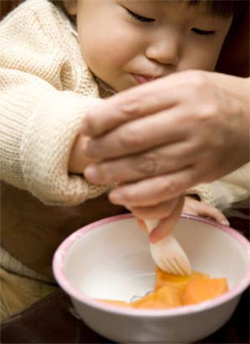

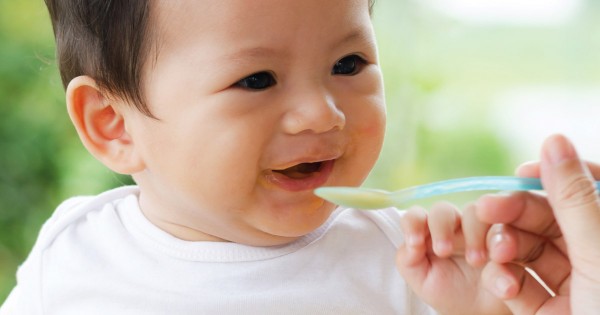
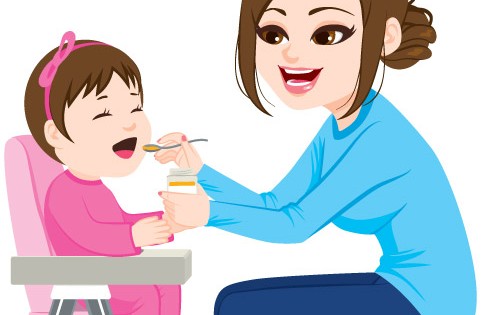
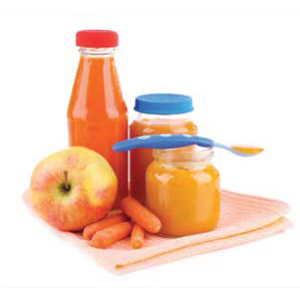
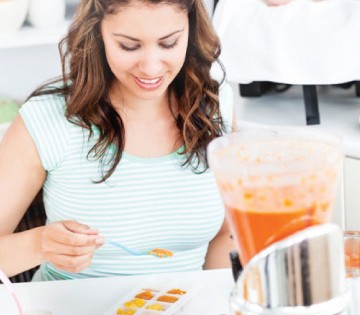
Comments